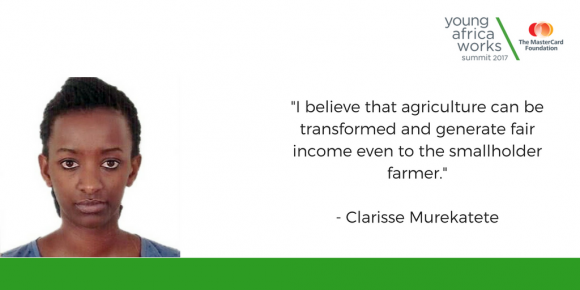
In 2014, a youth-led company, CARL Group, made up of four young entrepreneurs from Rwanda had an idea: to process orange-fleshed sweet potatoes (OFSP) and turn them into baked goods. Hardworking, determined, passionate and business-minded, the company has added value by taking what was once considered a valueless crop and creating healthy, consumable vitamin A products.

In 2014, a youth-led company, CARL Group, made up of four young entrepreneurs from Rwanda had an idea: to process orange-fleshed sweet potatoes (OFSP) and turn them into baked goods. Hardworking, determined, passionate and business-minded, the company has added value by taking what was once considered a valueless crop and creating healthy, consumable vitamin A products.
My name is Clarisse and I’m the Co-founder and Chief Marketing Officer of the CARL Group. I grew up in an area where sweet potatoes are grown extensively. Rwanda has been rated many times as one of the largest producers of sweet potatoes, growing approximately 80 kg per capita annually. They are farmed predominately by women.
Initially seen as a poor person’s crop, sweet potatoes have gained acceptance with the introduction of orange-fleshed sweet potato varieties that have higher yields and are better tasting than local varieties. The beta-carotene and vitamin A rich, orange-fleshed sweet potato is one of the few new crops that are an excellent source of energy and full of important nutrients that can improve the health of communities.
I knew that that malnutrition was an issue in my region. I would watch women sell tomatoes in black markets, while carrying their children under the sun and rain every day, with not much to eat or drink apart from fresh sweet potatoes. I grew up wanting to feed the hungry. As I matured, life improved to the point that black markets and street children nearly disappeared, but the rate of malnutrition still remained high. Research shows that 36.7 percent of children under the age of five suffer from vitamin A deficiency. This made me wonder if there was a different way to process sweet potato. My quest was to find out how an undervalued crop could be turned into a crop of unparalleled value, craved and eaten by everyone.
Inspired by that dream, I conducted a study about orange-fleshed sweet potatoes, and interviewed several sweet potato farmers to better understand the problems that they face. The results showed that many farmers had started to grow the new orange-fleshed sweet potato, but there was no market for their product because sweet potatoes, in general, were still considered a rural crop and food for animals. People were not willing to try the new type of sweet potatoes.
The CARL Group believes it can reduce poverty and malnutrition by educating people (mostly pregnant women, mothers, and children) about the nutritional value of sweet potato, offering a variety of products, and making them affordable and accessible throughout Rwanda. Farmers also benefit because there is now a market for those growing sweet potato in the areas of Ruhango, Muhanga, Rulindo and Gakenke.
As an agribusiness, The CARL Group is contributing to agricultural transformation by helping farmers move away from subsistence farming to market-oriented farming. We are committed to improving smallholder farmers’ livelihoods. In doing so, we hope to help them build resilience to climate change. By helping them understand, adapt and get involved with the irrigation system supported by the government, we hope they will be better positioned to tackle the challenge that climate change presents.
I believe that agriculture can be transformed and generate fair incomes for the smallholder farmer. The challenge for youth in this sector is their perception of agriculture. Youth shy away from it because it seems like tiresome and non-profitable work.
I hope to see a new generation of young, trained and educated farmers. Some might be organized in agro-clusters and work on the farm using modern mechanization, specialized storage, and irrigation techniques. Others may work off the farm in transportation, marketing, and distribution. Demonstrating that agriculture can generate improved incomes and production techniques will help to attract more youth to the sector.
Find the original blogpost on the Young Africa Works website.
This blogpost by Clarisse Murekatete is part of a blog series on the Young Africa Works Summit in Kigali, Rwanda on February 16-17. YPARD will be conducting a one day pre-Summit workshop on February 15 and a long term mentoring program to build on the youth delegates communication and networking skills in preparation for their participation at the Summit. For more information about the Summit visit the youngafricaworks.org website.
Photo courtesy: Young Africa Works

